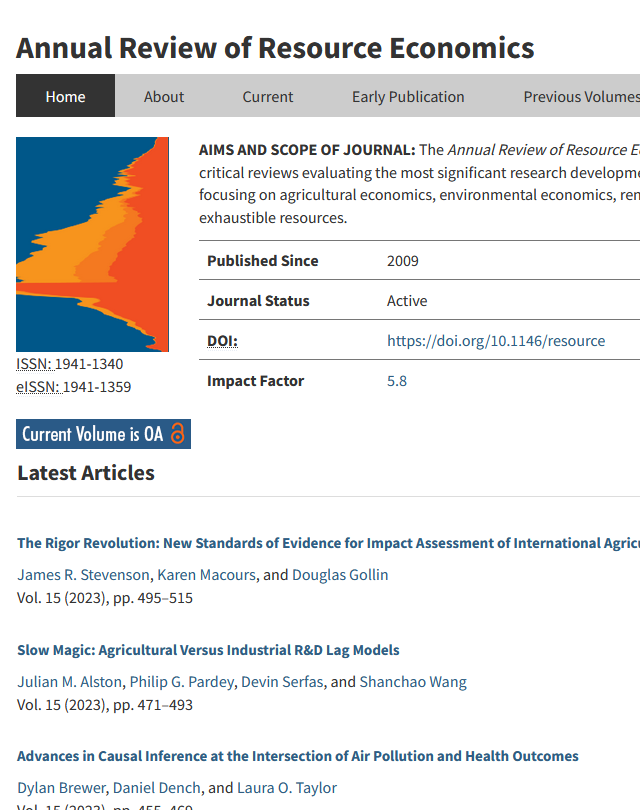理解不可能:对环境经济学肥尾的调查
IF 4.2
2区 经济学
Q1 AGRICULTURAL ECONOMICS & POLICY
Annual Review of Resource Economics
Pub Date : 2021-06-25
DOI:10.1146/annurev-resource-102020-094143
引用次数: 2
摘要
我们调查了环境经济学中关于厚尾分布的越来越多的文献。然后,我们研究了这些分布的理论和统计特性,特别关注这些特性何时可能在环境问题中出现。我们发现,在环境经济学中,有许多变量是“肥尾”的,包括气候敏感性、自然灾害的影响、传染病的传播以及人们表示的支付意愿。我们认为不同的肥尾分布源于共同的途径。最后,我们回顾了有关厚尾分布的政策含义及其解释争议的文献。我们的结论是,在证明肥尾对最佳环境政策的影响方面,文献已经取得了很大的进步。然而,还有很多问题还没有得到很好的理解,包括替代政策如何影响肥尾分布,在有许多肥尾问题的计算经济中,最优政策是什么,以及如何解释肥尾实证测试中的不精确性。《资源经济学年鉴》第13卷的最终在线出版日期预计为2021年10月。修订后的估计数请参阅http://www.annualreviews.org/page/journal/pubdates。本文章由计算机程序翻译,如有差异,请以英文原文为准。
Understanding the Improbable: A Survey of Fat Tails in Environmental Economics
We survey the growing literature on fat-tailed distributions in environmental economics. We then examine the theoretical and statistical properties of such distributions, focusing especially on when these properties are likely to arise in environmental problems. We find that a number of variables are fat tailed in environmental economics, including the climate sensitivity, natural disaster impacts, spread of infectious diseases, and stated willingness to pay. We argue that different fat-tailed distributions arise from common pathways. Finally, we review the literature on the policy implications of fat-tailed distributions and controversies over their interpretation. We conclude that the literature has made great strides in demonstrating when fat tails matter for optimal environmental policy. Yet, much is less well understood, including how alternative policies affect fat-tailed distributions, the optimal policy in a computational economy with many fat-tailed problems, and how to account for imprecision in empirical tests for fat tails. Expected final online publication date for the Annual Review of Resource Economics, Volume 13 is October 2021. Please see http://www.annualreviews.org/page/journal/pubdates for revised estimates.
求助全文
通过发布文献求助,成功后即可免费获取论文全文。
去求助
来源期刊

Annual Review of Resource Economics
AGRICULTURAL ECONOMICS & POLICY-
CiteScore
9.40
自引率
0.00%
发文量
34
期刊介绍:
The Annual Review of Resource Economics provides authoritative critical reviews evaluating the most significant research developments in resource economics, focusing on agricultural economics, environmental economics, renewable resources, and exhaustible resources.
 求助内容:
求助内容: 应助结果提醒方式:
应助结果提醒方式:


